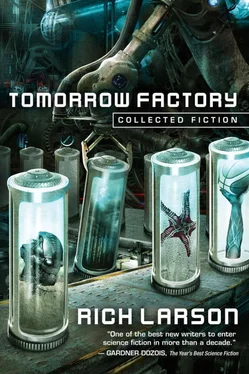“Anita is you need light to function,” Carver Seven says. “Anita is you need and is gone.”
“Yeah,” the Man says. There is lubricant shining in its photoreceptors. “Yeah. She was always a better swimmer than me. I don’t know how it happened.” The Man wipes at its photoreceptors to clear them. “Look, buddy, you should take the head back. When I told you…” It falls silent, looking at the boat again. “You’re just a robot,” the Man says, but to itself more than to Carver Seven. “And we’re nearly finished. You better head off, tin man. Back to work bright and early tomorrow.”
Carver Seven understands the sentiment. “Piss off, get out of here,” he says, waving one manipulator in the gesture the Man uses to end a work cycle.
“Yeah,” the Man says. “Same to you.”
It is still staring down at Carrier Three’s head when Carver Seven leaves the beach.
As soon as he enters the village, Carver Seven can tell something is wrong. The air is thick with speech, with the click and buzz and squeal of the clan in deep discussion, but when Carver Seven tunes himself to the frequency he finds it slippery, fragmented. First he suspects he has been damaged somehow, but then he realizes that the truth is far worse. The clan has excluded him.
Shock numbs him for a moment. He has spent most of the past three days out on the beach with the Man, but that is only because the workload in the village has been light. The last storm caused little damage. The decision on a new fence to keep animals out has been delayed while the Cartographers debate its placement. Carver Seven has neglected no duties.
He moves slowly through the village, still grasping instinctively at the speech around him but understanding none of it. Photoreceptors follow his progress. It is only when he sees the other Carvers crafting fresh spears, when he sees Recyler squatting frozen in discussion with the clan’s small and nimble Cartographers, that he begins to understand.
“Carver Seven, may Watcher-in-the-sky turn her gaze to you,” Cartographer Two says.
Carver Seven feels relief, first, that he can understand again. Then dread.
“We are sorry to have excised you from the debate,” Cartographer Two continues. “But it was felt that you are no longer impartial regarding the Man. We have reached consensus without you.”
Carver Seven looks at Recycler, but it would be disrespectful to ask her what she has done, and why, when being addressed by the clan.
“The Man, by your own admission, seems able to think and communicate as a clan member would,” Cartographer Two says. “Because of that, it must be held accountable for blaspheming. Does the Man not claim to have created the clan? Usurping the role of Watcher-in-the-sky?”
There is only one truthful response. “Yes. It does claim this.”
“Because of this blasphemy, we have decided the Man will be shut down,” Cartographer Two says. “We go to the Man’s shelter in the morning. Recycler has been given permission to disassemble and study its corpse afterwards.”
Carver Seven looks at Recycler again and feels something he has never felt before. It reminds him of the Man wailing at the sky, it reminds him that his blades are sharp and he could plunge them into Recycler and damage her, damage her, damage her. She has betrayed him.
Now the clan will kill the Man, and his last hope for Carrier Three will die with it.
Recycler heads quickly toward the edge of the village, back toward her shelter and her flat rock. Carver Seven wants to tell the Cartographers what she does in the night, how she hunts and feeds and no longer needs Watcher-in-the-sky. He doesn’t. He keeps her secret. But he follows her to the wood, and in a high piercing frequency, he speaks.
“All this so you can dissect the Man,” he says. “So you can suck its blood. You are no better than an animal, Recycler. May Watcher-in-the-sky avert his gaze forever.”
Recycler is silent for a long moment. “I told the clan for your sake,” she finally says. “So the Man will not lie to you anymore. You will be grateful in the end.”
Then she disappears into the forest, and Carver Seven does not follow her. Instead he goes toward his own shelter, the one with a widened frame for when Carrier Three sometimes wanted to pass the storm together. He stops on the way to pick up a branch full of thick green leaves. The other Carvers look over to him. He asks if they have sufficient spears to kill the Man that is so fearsome, with its soft red skin and weak manipulators. They assure him they do.
Carver Seven has no tasks to complete. He can go dormant early if he wishes. He walks into his shelter and begins tearing the leaves off the branch, one by one.
Carver Seven wakes up in the dark. It is terrifying. It feels like his photoreceptors have been gouged out, leaving him blind. But he has no time to be terrified. His early shutdown now gives him only a few moments of residual energy. He reaches for the crushed leaves and opens his hidden mouth.
The orifice whirrs and grinds and Carver Seven feels a different kind of energy, rough-edged and erratic, move through his body. It is nothing like the warm comforting pulse of Watcher-in-the-sky. It feels ugly. He sees why the clan forgoes its use apart from emergency, but this, he reasons, is an emergency.
The dark is awful, but Carver Seven knows where he is. He knows that the distances from the shelter to outside the shelter to the path to the beach have not changed. He starts to walk, hearing his invisible treadfeet slap against packed dirt, rustle against leaves and vines. He feels the forest swallow him and hears the sounds of animals. It is difficult not to imagine them stalking him through the forest, drawn to his heat. Some branches have moved since he last walked these footsteps and each one startles him as it whips against his body.
Finally, he hears his treadfeet rasp on sand. He is on the beach. And even better, there is light. Carver Seven can make out the shape of the shore in front of him, the spiky mass of the forest behind him, even the rippling sea. Confused, he looks up at the sky. It is not the black void he had always imagined it to be when Watcher-in-the-sky blanks her photoreceptor. It is full of small glimmering fragments that look like lifelights thrown up into the darkness.
Recycler never mentioned such a thing. Carver Seven wants to stare for longer, but there is no time. He turns toward the leaning shelter the Man has made in a divot of sand. There is light there, too, from the dying embers of the fire the Man sometimes makes to keep its body warm and alter meat before eating it.
Carver Seven does not want to make noise in case Recycler is awake, as he is. Instead he crouches and moves far enough inside the shelter to place his manipulator against the Man’s prone foot.
The Man thrashes upright. “What the fuck?”
Carver Seven gives up on not making noise. “Back to work bright and early,” he says. “Look who it is.”
“It’s the middle of the goddamn night,” the Man says. “I meant in the morning, and…” It rubs its photoreceptors. “Don’t you shut down for night? There’s no sunshine.”
“Some time you gotta improvise,” Carver Seven says. “In morning the Man is no see, no think, no talk.”
“What?”
Carver Seven struggles for a way to communicate the concept of involuntary shutdown. He is not even sure the Man is aware of its own mortality. He picks up one of the spears, its tip stained red, and jabs it into the air.
“In morning, other tin mans hunting you,” he says. “Other tin mans cut up you.”
The Man’s photoreceptors go large and Carver Seven knows it understands.
“Learning a new way, huh,” it says. “Jesus. You’re going to be us all over again. Predation is step one.”
Читать дальше












